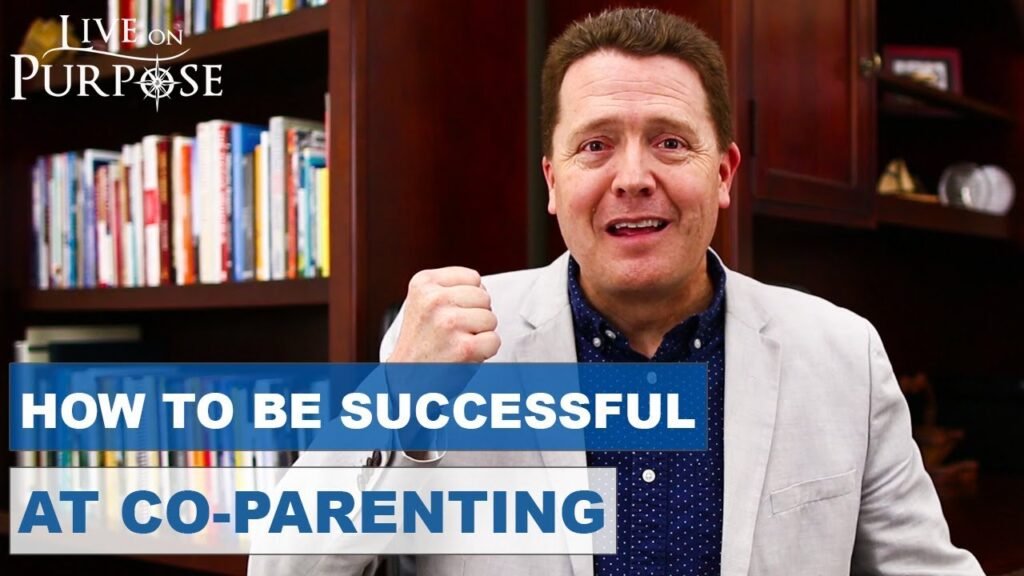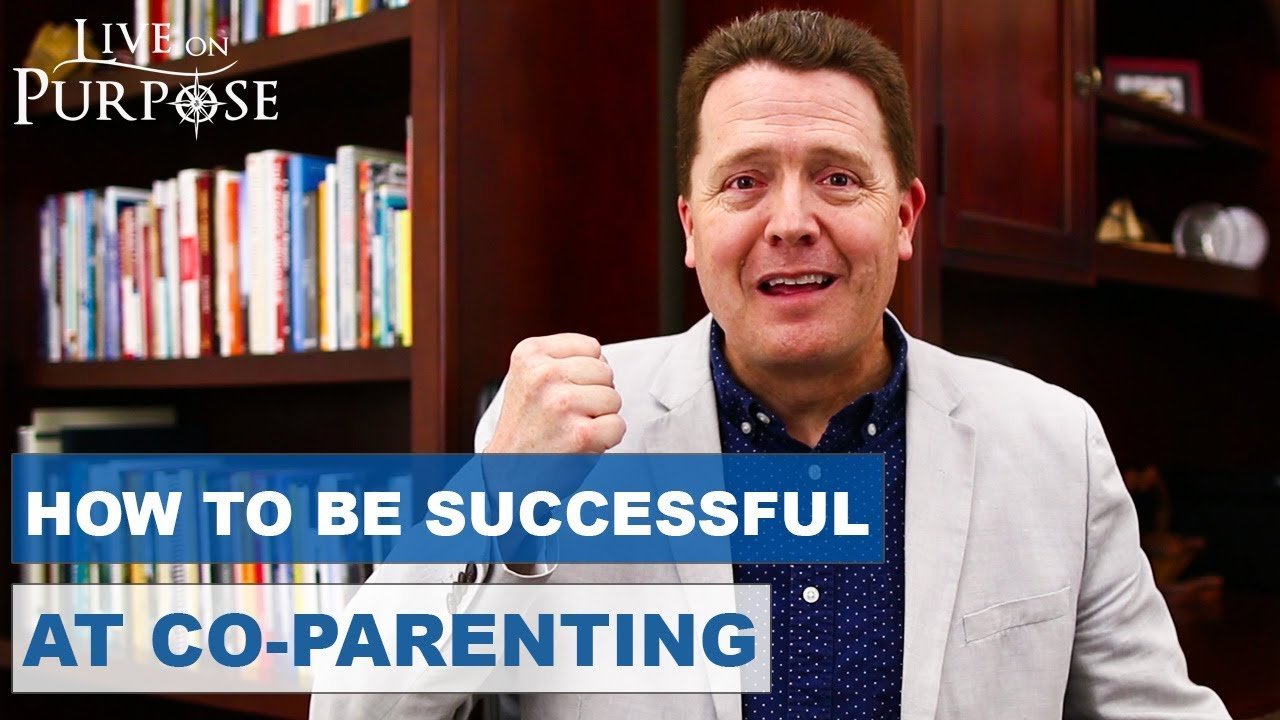In today’s article, we will be discussing the top 10 ways to become a better co-parent. Co-parenting can be a tricky and challenging parenting approach, especially when there are multiple households involved. The focus will be on effective co-parenting, with principles that can be applied to all kinds of parenting. We will cover topics such as forgetting about the “co” and becoming a better parent, keeping the focus on the kids, practicing positivity and forgiveness, getting to yes, assuming the best, leading with gratitude, staying in front of your “but”, and always erring on the side of generosity and kindness. Remember, the goal is to improve your own parenting skills and establish a better co-parent relationship, so stay tuned for valuable insights and tips!
In this video by Live On Purpose TV, Dr. Paul Jenkins shares his expertise on how to be a better co-parent. He addresses the challenges that come with co-parenting, especially in blended families or after a divorce. Dr. Jenkins provides a list of the top 10 ways to improve your co-parenting skills, including forgetting about the “co” and focusing on better parenting, keeping the focus on the kids, practicing positivity and forgiveness, getting to yes, assuming the best, leading with gratitude, and staying in front of your “but”. These tips can be applied to all kinds of parenting situations and can help create a more effective co-parenting relationship. Remember, the key is to improve your own parenting skills and maintain a positive mindset for the well-being of your children.
Forget about the “co”, become a better parent
Co-parenting can be a challenging and complex situation, but one of the best ways to improve your co-parenting relationship is by focusing on becoming a better parent individually. By prioritizing your own parenting skills and personal growth, you can create a positive impact on your children’s lives and enhance your co-parenting dynamic.
To become a better parent, it’s essential to invest time and effort in understanding your children’s needs and well-being. Shift your focus from the “co” aspect of co-parenting and prioritize the emotional, physical, and mental development of your children. This means actively engaging with them, being present in their lives, and providing a safe and nurturing environment for them to thrive.
Take responsibility for your own parenting skills and seek personal growth opportunities. This may involve reading parenting books, attending workshops or seminars, or even seeking advice from other experienced parents. By continuously improving your parenting skills, you can better understand your children’s needs and address any challenges that may arise.
Additionally, it is crucial to foster a healthy and positive relationship with your children. Spend quality time with them, listen to their thoughts and feelings, and actively participate in their hobbies and interests. By creating a strong bond and open communication, you can ensure that your children feel loved, supported, and heard, regardless of the co-parenting situation.
Kids issues do not equal parents issues
It is imperative to differentiate between your personal issues and your children’s needs when co-parenting. As parents, you may have adult problems or conflicts that can impact your emotions and mindset. However, it is crucial to shield your children from these issues and avoid involving them in adult matters.
Maintaining open communication with your co-parent is essential to address child-related issues effectively. Engage in respectful and constructive conversations about your children’s needs, schedules, and any concerns that may arise. By keeping the focus on your children, you can work together to find suitable solutions that prioritize their well-being.
In some cases, seeking professional help or counseling may be necessary to navigate difficult co-parenting situations. A trained therapist can provide guidance and support to both parents, helping them better understand their own emotions and develop effective co-parenting strategies.
Remember, co-parenting is about putting your children’s needs first. It is essential to create a harmonious and stable environment for them, free from unnecessary conflict or negative emotions.
Practice positivity and forgiveness
Maintaining a positive mindset and practicing forgiveness is crucial in any co-parenting relationship. Divorce or separation can bring out emotions such as anger, resentment, or hurt, but holding onto these negative feelings can hinder the co-parenting process.
Instead, focus on the positive aspects of co-parenting, such as the opportunity your children have to maintain a relationship with both parents. Let go of grudges and forgive past mistakes, recognizing that everyone is human and capable of growth. By practicing forgiveness, you can create a healthier and more productive co-parenting environment.
Avoid speaking negatively about the other parent in front of your children, as this can create unnecessary tension and emotional distress. Instead, model positive behavior and promote a peaceful atmosphere for your children. Remember, children benefit from seeing their parents work together and maintain a respectful relationship.
Creating a peaceful and harmonious co-parenting environment not only benefits your children but also allows both parents to communicate effectively and collaborate on important decisions.

Get to yes
When co-parenting, finding common ground and working towards mutually beneficial solutions is essential. While both parents may have different perspectives, it is important to prioritize the well-being and best interests of the children.
Practice compromise and flexibility when discussing and resolving co-parenting matters. Focus on the bigger picture and the long-term benefits for your children. Sometimes, this may require setting aside personal preferences or differences for the sake of your children’s happiness and stability.
Effective communication is key when working towards agreements. Listen actively to the other parent’s concerns and opinions, and express yourself clearly and respectfully. By communicating effectively, you can reach compromises that meet the needs of both parents and, most importantly, the children.
Assume the best
In a co-parenting relationship, it is crucial to assume the best about the other parent. Give them the benefit of the doubt and avoid making negative assumptions or judgments based on past experiences or personal biases.
Promote trust and goodwill by assuming that the other parent has good intentions and genuinely cares about the well-being of the children. By approaching co-parenting with a positive mindset, you can set the foundation for a more cooperative and effective parenting partnership.
Building a cooperative partnership takes time and effort. Focus on actively listening to the other parent’s concerns, collaborating on major decisions, and finding common ground. By assuming the best in each other, you can build trust and foster a healthier co-parenting relationship.
Lead with gratitude
Expressing gratitude for the efforts and involvement of the other parent can go a long way in improving the co-parenting dynamic. Acknowledge and appreciate their contributions to parenting, whether it’s attending school events, helping with homework, or spending quality time with the children.
By expressing gratitude, you create a positive co-parenting atmosphere that benefits both parents and children. It shows your willingness to recognize and celebrate shared successes, fostering a sense of teamwork and cooperation.
Remember to be specific when expressing gratitude. Instead of vague statements, highlight specific actions or behaviors that you appreciate. This allows the other parent to understand exactly what they are doing well and encourages them to continue making positive contributions to parenting.
Creating a positive co-parenting atmosphere through gratitude can enhance communication, build trust, and strengthen the overall co-parenting relationship.
Stay in front of your but
To be an effective co-parent, it is important to avoid making excuses or blaming the other parent for challenges that arise. Take ownership of your actions and responsibilities and focus on finding solutions rather than dwelling on problems.
Instead of focusing on reasons why something cannot be done or why the other parent is at fault, adopt a proactive and accountable approach. Identify strategies and resources that can help overcome obstacles and work towards a resolution.
Maintain open and respectful communication with the other parent, even when discussing difficult or sensitive topics. By taking responsibility for your actions and maintaining a proactive mindset, you can contribute to a more productive co-parenting relationship.
Always err on the side of generosity and kindness
Approaching co-parenting with empathy, understanding, generosity, and kindness can create a more peaceful and cooperative environment. Show empathy towards the other parent’s perspective and challenges they may face. Understand that they may be navigating their own parenting journey and difficulties.
Extend grace and kindness, especially during challenging times. Instead of engaging in unnecessary confrontations or conflicts, choose love and compassion. By doing so, you can de-escalate tense situations and foster a more positive co-parenting atmosphere.
Remember, prioritizing the well-being and happiness of your children is paramount. Always consider the impact of your actions on them and choose the path of generosity and kindness to create a nurturing environment for their growth and development.
Keep the focus on the kids
When co-parenting, it is crucial to make decisions based on the best interests of the children. Prioritize their emotional well-being, stability, and overall development. This means putting their needs first and working together with the other parent to create a united front in parenting decisions.
Involve your children, when appropriate, in decision-making processes. This allows them to express their thoughts and preferences, helping them develop a sense of autonomy and responsibility.
Creating a united front in parenting decisions can also help maintain consistency and routine for your children, regardless of the co-parenting situation. When children see their parents working together and communicating effectively, they feel more secure and supported.
Remember, co-parenting is about working together to provide the best possible environment for your children’s growth and happiness. Keeping the focus on their well-being can lead to better outcomes for all involved.
Conclusion
Effective co-parenting requires effort, positivity, and forgiveness. By shifting your focus from the “co” aspect of co-parenting to becoming a better parent individually, you can create a positive impact on your children’s lives and improve the co-parenting relationship.
Differentiating between personal issues and children’s needs is crucial to create a healthy co-parenting dynamic. Practicing positivity, forgiveness, and effective communication can transform the co-parenting experience and promote a peaceful and harmonious environment for everyone involved.
When co-parenting, it is important to assume the best in the other parent, lead with gratitude, and prioritize the well-being of the children. By staying proactive, accountable, and focused on the children, you can navigate co-parenting challenges and foster a cooperative parenting partnership.
Remember, effective co-parenting requires ongoing effort and a commitment to prioritizing the well-being of the children. Applying these principles benefits all types of parenting situations and can lead to better outcomes for everyone involved.
For further tips and insights on co-parenting, refer to the Parenting Power-Up resource or consult with professionals specializing in co-parenting. With dedication and a positive mindset, you can create a nurturing and supportive co-parenting environment for your children’s growth and happiness.

